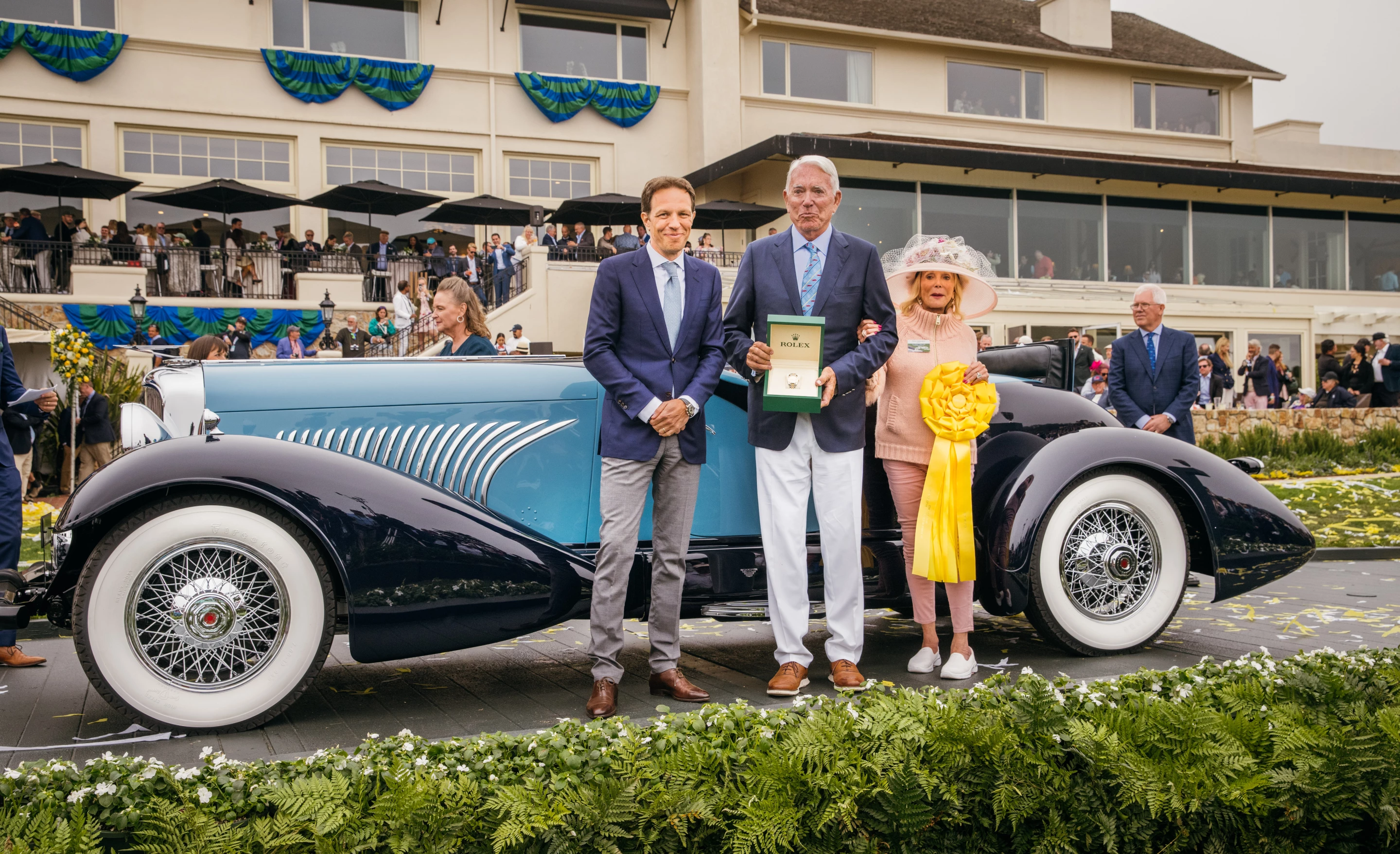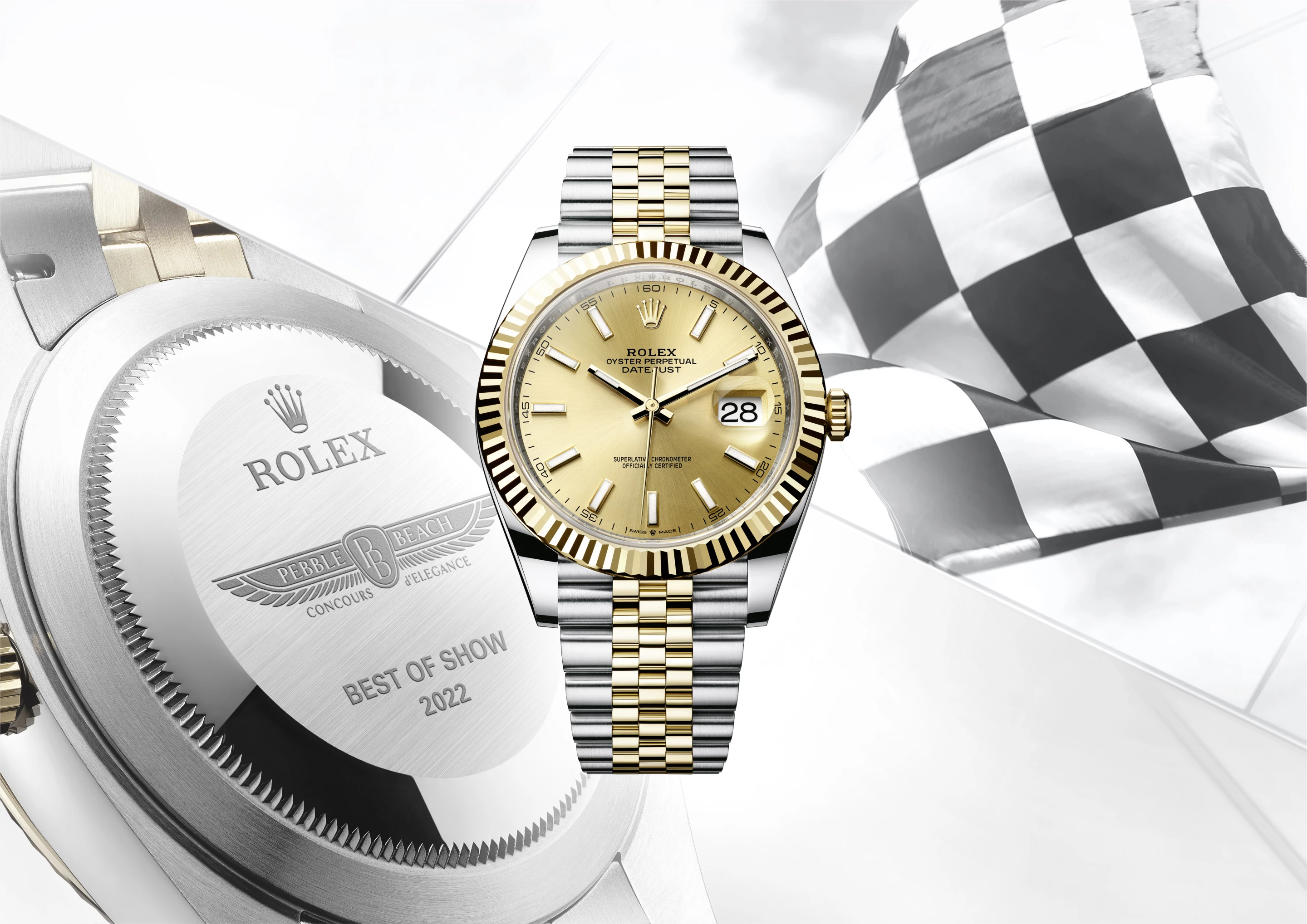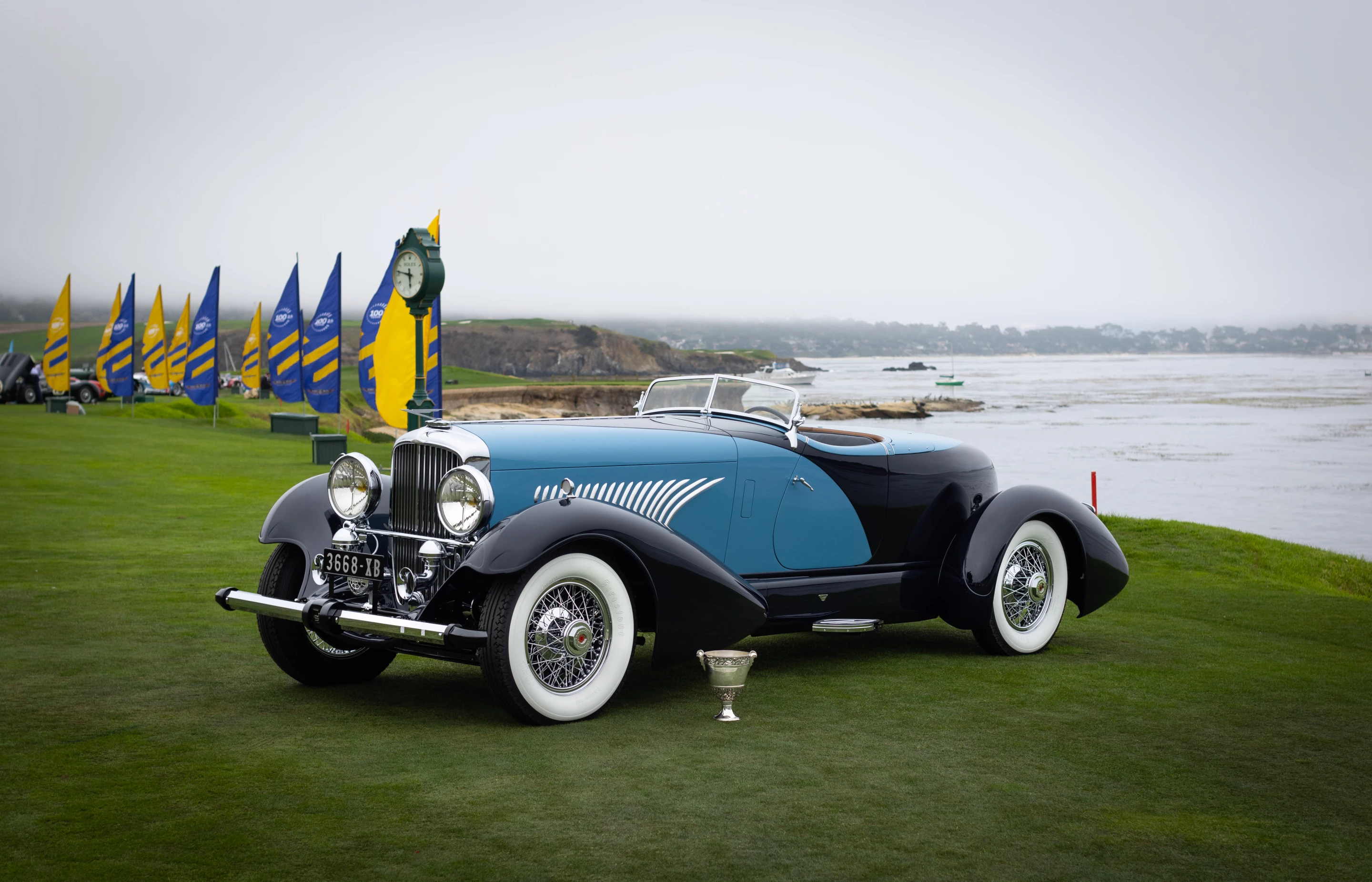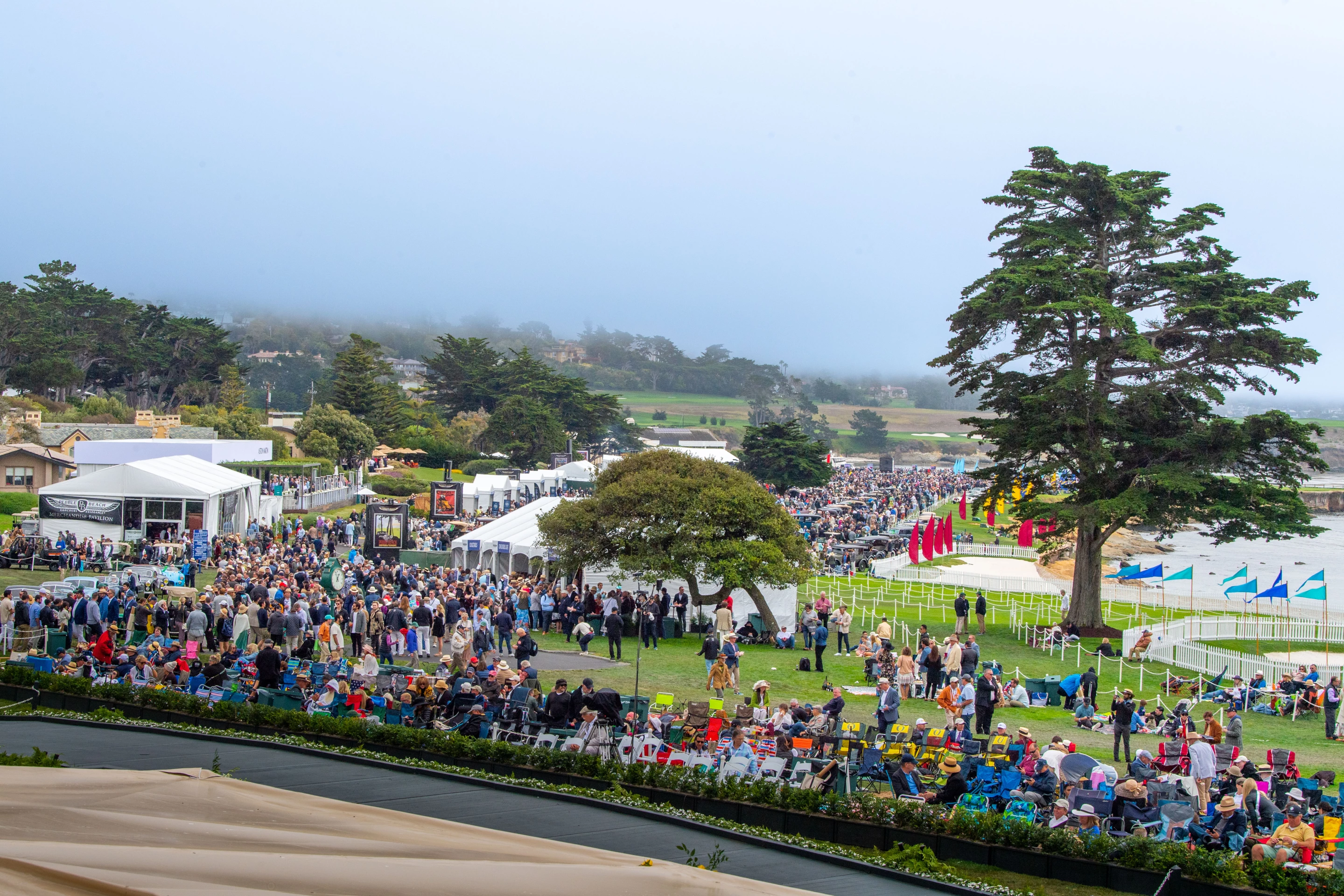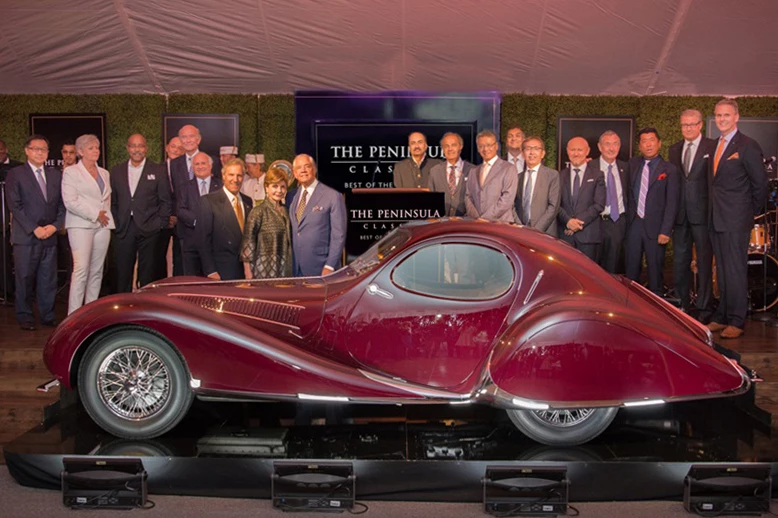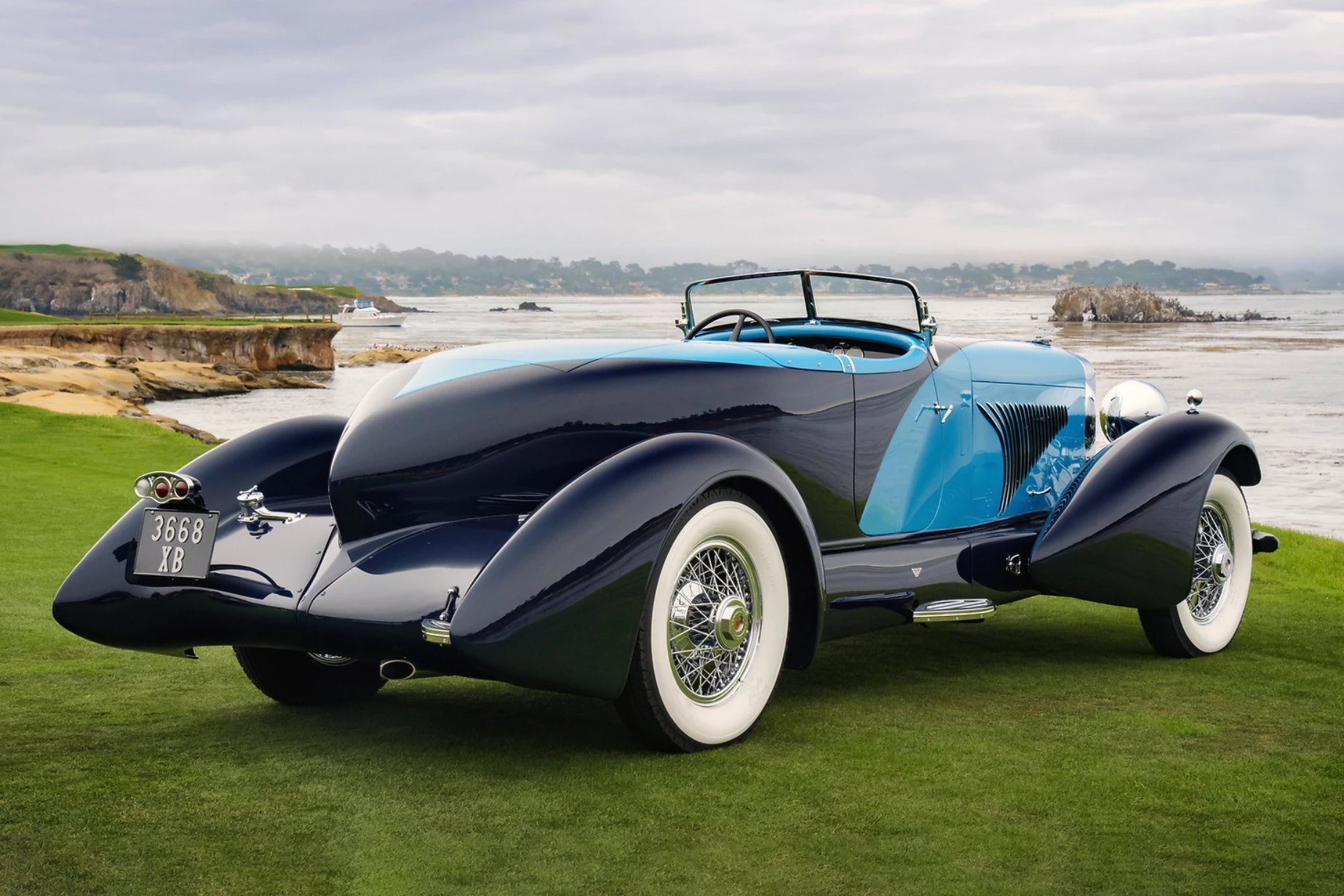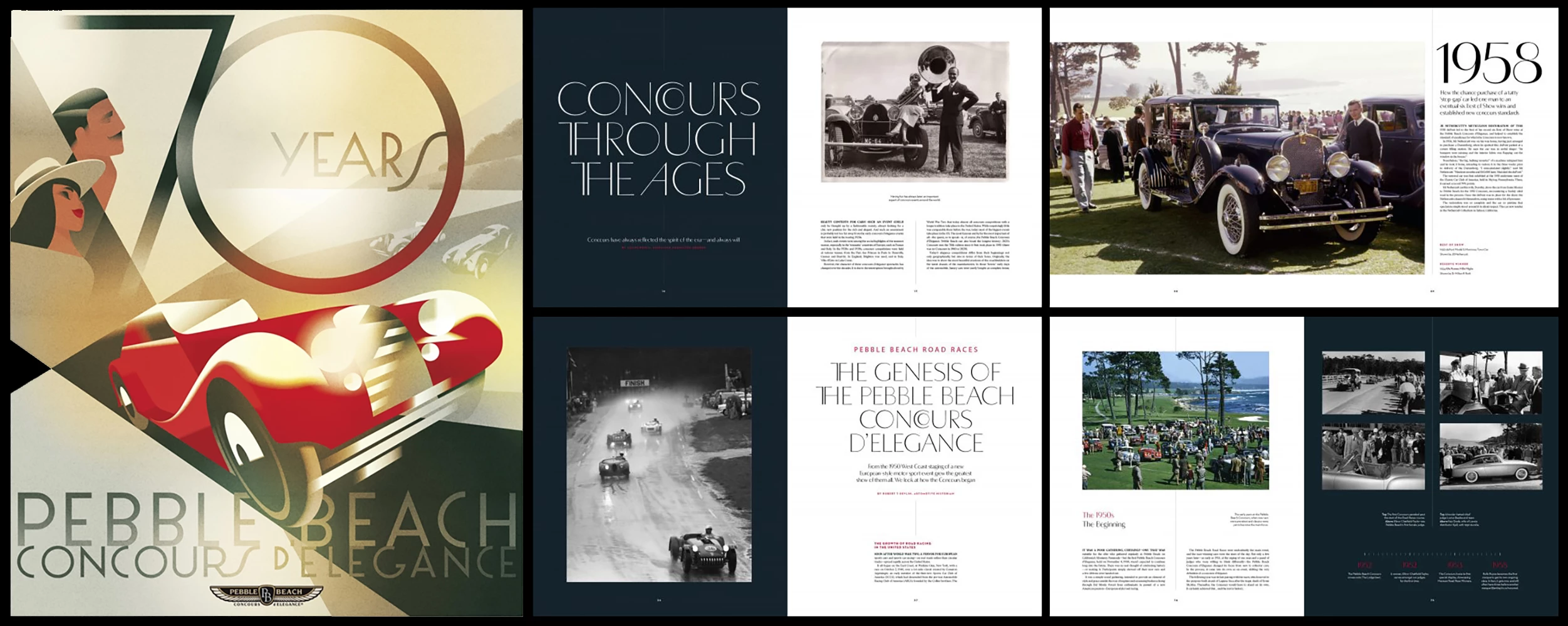The 71st Pebble Beach Concours d’Elegance has been run and won, with a 1932 Duesenberg J Figoni Sports Torpedo taking out the most prestigious concours event on the international calendar against one of the strongest fields ever assembled, with finalists including a 1937 Talbot-Lago T150C-SS Figoni & Falaschi Teardrop Coupé, a 1930 Duesenberg J Graber Cabriolet, and a 1951 Talbot-Lago T26 Grand Sport Stabilimenti Farina Cabriolet.
We'll follow up with more information on the winning car when it is available, as the bones of the story make for quite some tale. As is often the case at automotive beauty shows, the winning car was "dressed" by Giuseppe (also known as Joseph) Figoni, one of the world's most influential automotive couturiers. In 1923, Joseph Figoni opened his own coachbuilding enterprise, Carrosserie Joseph Figoni, in Paris, developing his craft but being ultimately compromised by the business necessities of creating what was essentially an industrial concern.

In 1935 he would join with businessman Ovidio Falaschi to form the Figoni et Falaschi, and once free of the imperatives of running a business, his creativity was better marketed, better monetized and he became one of the most creative forces in automotive history. His entire body of work can best be described as the point where art and fashion meet with automotive design.
Ovidio Falaschi viewed the company as "true couturiers of automotive coachwork, dressing and undressing a chassis one, two, three times and even more before arriving at the definitive line that we wanted to give to a specific chassis-coachwork ensemble." The creation of a complete body at Figoni et Falaschi would routinely require more than 2,000 hours, and the results are evident in the prices fetched by Figoni creations at auction, and their prominence as concours finalists around the world.
In evidence of the immense influence of Figoni's mastery, Figoni designed the coachwork on two of the final four contestants for the 2022 Pebble Beach Concours d’Elegance "Best in Show."

Figoni's ‘Goutte d’Eau’ bodies are among the most sought after cars in the world. A 1937 Talbot-Lago T150-C SS Coupé aérodynamique ‘Goutte d’Eau’ by Figoni & Falaschi was the inaugural winner of the Peninsula Classics "Best of the Best" Award. Chosen each year from the winners of the world’s finest international concours events, the winner of this award is unquestionably the most exceptional concours car in the world for that year. In awarding the 2015 award at Monterey in August 2016, award co-founder Sir Michael Kadoorie said, "It has been said that the look of the Talbot-Lago Teardrop epitomized speed, aerodynamic efficiency and elegance. Its form was perfect for an object in motion, resembling raindrops as they fall to earth.” Two have been to auction so far this year, with a near identical car to Fritz Buckard's 2022 Pebble Beach finalist selling for $13,425,000 at Gooding & Company's Amelia Island auction, and a 1938 model sold at RM Sotheby's 2022 Monterey auction for $7,265,000.

The 2022 winning car is a unicorn. It's the only Duesenberg Model J bodied by Joseph Figoni, one of the world's foremost automotive couturiers, as can be evidenced by the finalists in this year's event: Figoni designed the coachwork on two of the final four contestants for the 2022 Pebble Beach Concours d’Elegance "Best in Show."

Produced 90 years ago at a time when the world was in the grip of the "Great Depression", the Duesenberg chassis and powertrain used the 7-liter (420-cu-in), DOHC, four-valve, eight-cylinder Duesenberg Model J, which was immensely expensive in America where just 482 were ever built, but doubly so when it had to be shipped to Europe in the midst of the greatest financial downturn in history.

Just to put the price of the Duesenberg in perspective, the chassis and power train of the winning 1932 Duesenberg Model J would have cost around $9,500 when it was new 90 years ago. At that time, the average U.S. physician earned less than $3,000 a year. Wikipedia's Duesenberg Model J entry suggests most completed Duesenberg Model Js cost between $13,000 and $19,000 (that is, with the body built and fitted), with two American-bodied J's reaching $25,000, and the prices charged by European coachbuilders even higher.

This car was shipped to Paris where Figoni worked his magic and it was then used in the Paris-Nice rally and a concours event before the first owner, a Peruvian sugar heir by the name of Antonio Chopitea, took delivery. From there, the history of the car gets quite vague. It s believed to have arrived in America after the war, with the car and body subsequently separated and sold, with two different cars using the Model J chassis/drivetrain and Figoni body until quite recently.
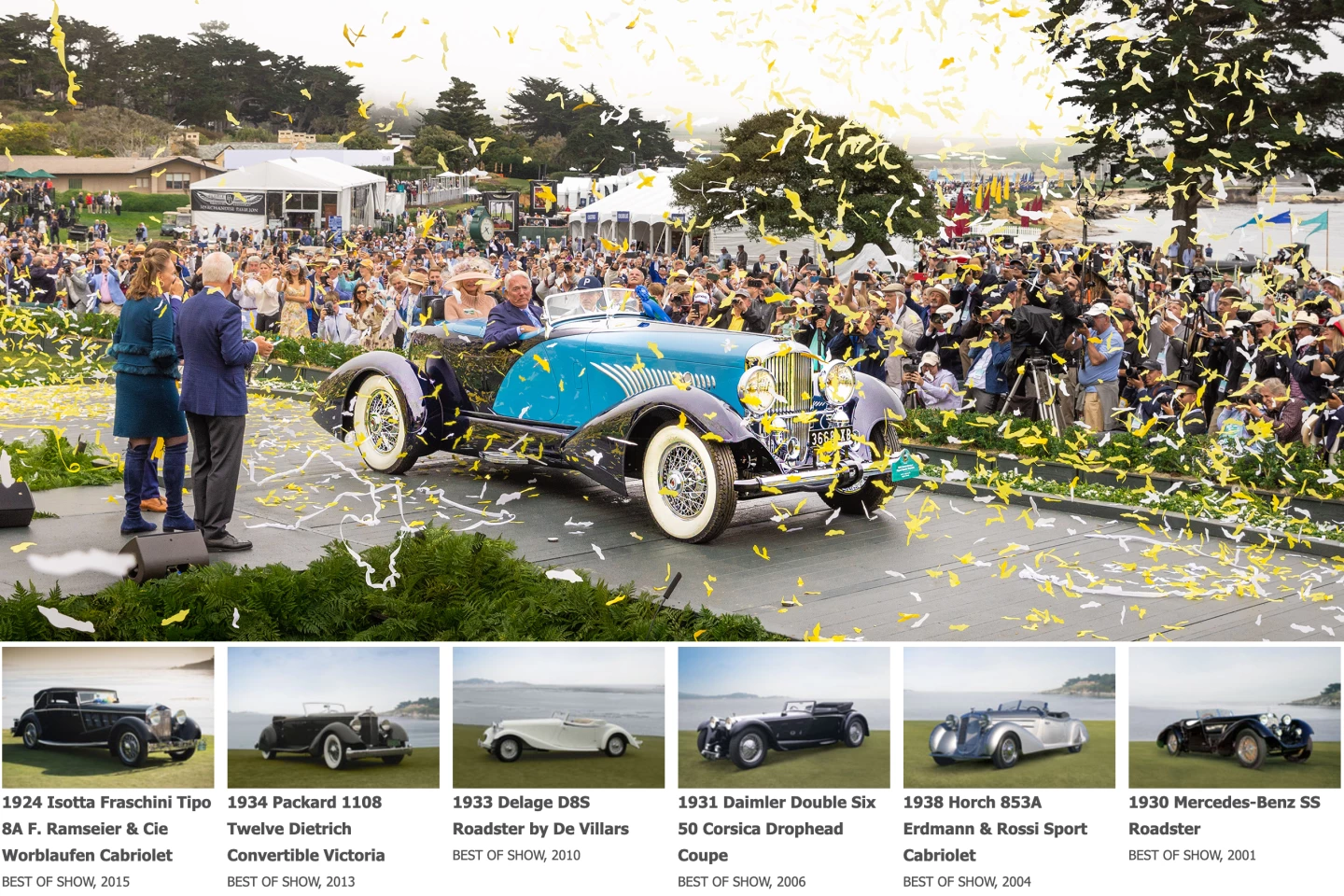
Rob Meyers (the RM in RM Sotheby's) played a role in bringing the two original pieces together for current owner Lee R. Anderson Snr. and once Anderson had the pieces of the original car, a three-year restoration was undertaken with RM Auto Restorations (RM Sotheby’s in-house restoration shop), which resulted in the winning car. We hope to bring you the entire story at some point.
The Winner of the Quail: A Motorsport Gathering

In recent times, thanks to the business and PR expertise of the organizers and the venue becoming the most important launching pad for uber luxury vehicles in the world, the concours winner of "the Quail" is becoming almost as important as the winner of the Pebble Beach Concours d’Elegance. Given the two are separated by just 48 hours and 8.1 miles, and both winners become finalists in the Peninsula Classics Best of the Best Award (which is also inextricably linked with the Quail), the 2022 winner of the Quail is a particularly significant automobile.
Next year, when the judging of the Peninsula Classics Best of the Best Award is presumably returned to the post-covid Retromobile in Paris in early February, in the centenary year of the 24 Hours of Le Mans, the 1956 Jaguar D-Type that won this year's Quail might seemingly have even more significance than it does now. Just 75 examples of the Jaguar D-Type were built in period, and the design was beautiful, aerodynamically superior and quite radical, employing a great deal of aviation technology. The most notable new technology was the monocoque construction which enabled lightweight and quite rigid construction, and the D-Type won the world's most important race in 1955, 1956 and 1957, staging a remarkable 1-2-3-4 finish in 1957.
Last year our report on "the Quail" characterized it in the headline as "The Quail 2021 had more elite car launches than any car show" and our report on this year's Quail further emphasized the same aspects. Monterey Car Week attracts one of the highest live audiences of high net worth individuals on Earth, and the sale of a half a billion dollars worth of cars in this year's auctions will only increase the move towards more new car releases during Monterey Car Week. With the Pebble Beach Concours d’Elegance agenda already overwhelming, it's hard not to see more new car releases heading to the Quail in coming years as the era of the internal combustion engine draws to a close and the pimping of new models will become necessary for the survival of existing marques.
Monterey Car Week 2022

While the central focus of Monterey Car Week is unquestionably the Pebble Beach Concours d’Elegance, the week-long automotive celebration consists of more than two dozen events, each with a distinct audience segmented by marque, gender, marque nationality, mindset and even where you bought your car (the BaT Alumni Gathering was over-subscribed). There's something for everyone, ranging from free entry through to extremely expensive, and there are lots of behind-closed-doors get-togethers
This year the biggest news was the emergence of the already prominent Hagerty Group into a much bigger, much more influential, Hagerty Group. Not very long ago, Hagerty was an insurance company, albeit the largest in America in the collectible car space, with the lion's share of the collectible car marketplace insured, 650,000 members in the Hagerty Drivers Club, and a promotional presence at more than 2,500 car events annually. Last year Hagerty began buying up events such as the Amelia Island Concours d'Elegance, the Concours d'Elegance of America, the California Mille and the Greenwich Concours d'Elegance, and in December 2021 the company floated on the New York Stock Exchange, entering 2022 with a market cap of $4.3 billion.

Most recently, it purchased Broad Arrow Auctions, which had its extremely promising first outing at this year's Monterey Car Week, and McCall's Motorworks Revival which had been a Monterey Car Week staple for many years, promptly rebranding it as Motorlux by Hagerty and making it even better.
The purchase of Broad Arrow portends some extremely ambitious plans for the group, with what appears to be a cradle-to-grave relationship with every collectible car and every enthusiast, clipping the ticket at every transaction. We expect the group will become the dominant presence on the American collector car stage, with the potential to go beyond its current borders of enthusiast vehicles and the American marketplace.
100 Years of the 24 Hours of Le Mans

The 24 Hours of Le Mans will celebrate its 100th running in 2023, and the legendary endurance event unveiled its special Centenary Trophy in Monterey last weekend.

The 24 Hours of Le Mans Centenary Trophy was revealed at the Pebble Beach Concours d’Elegance on 20 August, 2022, and will be awarded to the winners of the endurance race on its 100th anniversary on 10-11 June 2023. The prestigious piece is made of bronze and stands more than one-and-a-half meters tall. It will promote the iconic race by being displayed at high-profile automotive fixtures around the world.
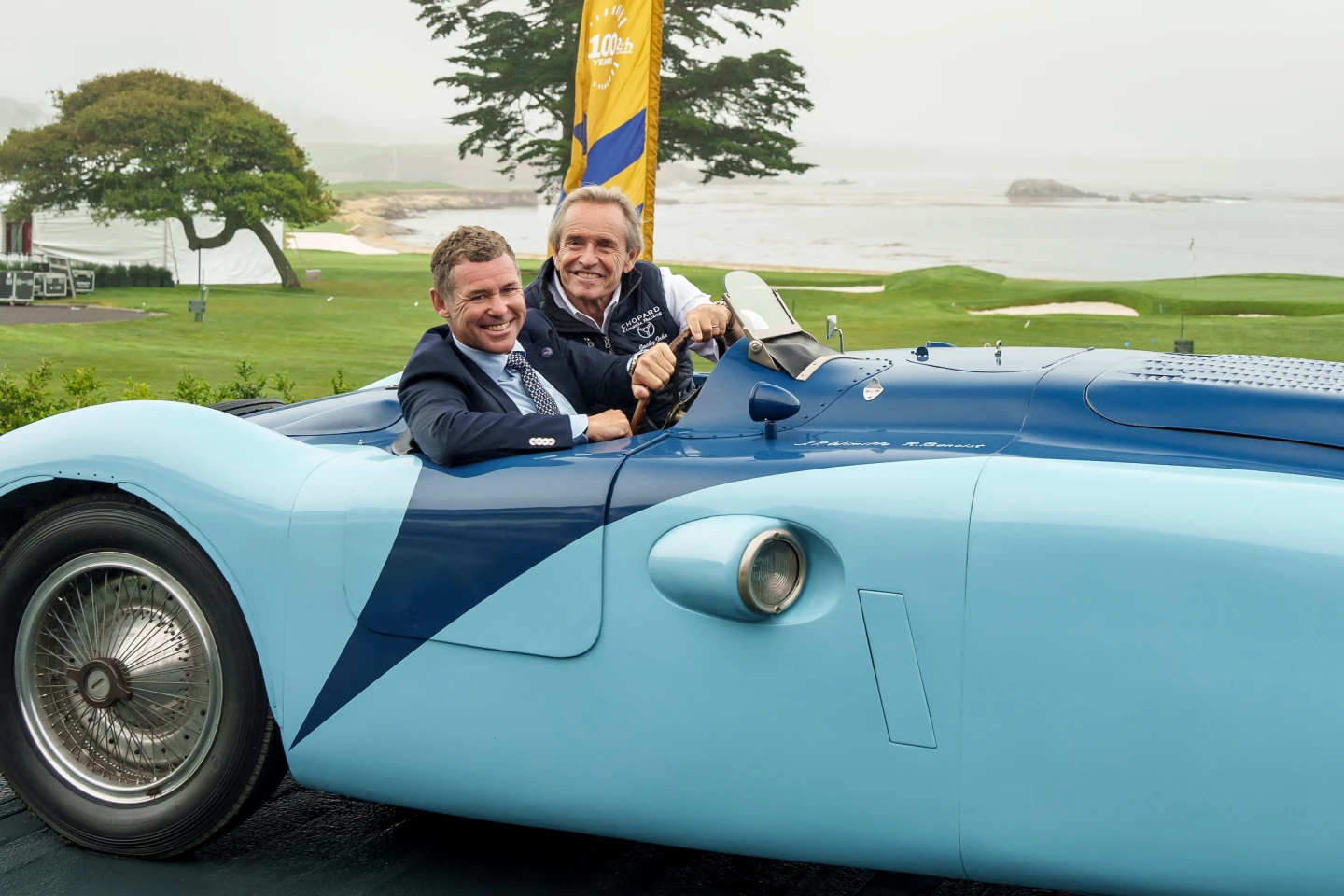
If you missed the trophy at Pebble Beach, you can see it at the Goodwood Revival, Chantilly Arts et Elegance Richard Mille, 8 Hours of Bahrain, Retromobile 2023, or The Ice International Concours of Elegance St Moritz.
The Monterey Car Auctions

With total receipts across all auctions somewhere north of $470 million, and another $20 million for the undisclosed McLaren F1 sale price, the 2022 Monterey car auctions were the largest in history, which overshadowed the performance of RM Sotheby’s because it smashed a spate of world auction records in Monterey. With its visible auctions totaling $239.2 million and that same $20-million McLaren F1 on top of that, it sold a quarter of a billion dollars worth of cars on its own – that's more than the previous record of US$217 million achieved by Mecum's Kissimmee (Florida) event which kicked off 2022 and it was also more than all the other 2022 Monterey auctions combined.

Between the first bids on Thursday and final bids on Saturday, around 1,050 cars were auctioned, and around 790 cars were sold at an average price of close to $590,000 in roughly 60 hours. That's approximately 25% more than the previous Monterey high mark of around $395 million set in 2013.

The highest known sale of the auctions was $22,005,000 for a 1955 Ferrari 410 Sport Spider that was raced in period by Juan Manuel Fangio, Phil Hill, Eugenio Castellotti, Masten Gregory, Richie Ginther and Carroll Shelby, who won more races as a driver in this car than any other, with eight wins and 10 podiums.

Only one other car crested the $10-million mark and that was the 1937 Bugatti Type 57SC Atalante that sold for $10,345,000 at the official Pebble Beach Auction of Gooding & Company. Estimated to fetch between $10,000,000 and $12,000,000, it is one of just 17 Type 57S Atalantes built and is "arguably the finest extant", which means something given David Gooding sells most of those that reach auction. It was last seen at auction at Pebble Beach in 2013 when Gooding & Company sold it for $8,745,000, and it fell just a few dollars short of the last comparable car to go to auction which sold for £7,855,000 ($10,413,535) in London in 2020 at Gooding & Company's inaugural Passion of a Lifetime auction.

